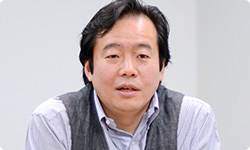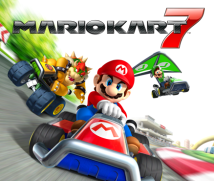1. ''We´re the Same!''
Our second session on Mario Kart 7 covers the in-house staff. Yabuki-san, who was a topic of conversation in Iwata Asks: Mario Kart 7, has come today, and Konno-san is here again. Let’s start introductions with Yabuki-san, who’s next to him.
I’m Yabuki from the Software Development Department in the Entertainment Analysis & Development Division (EAD). I was director of Mario Kart 7.
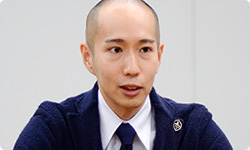
I’m Shiraiwa, also from the Software Development Department. I was program director.
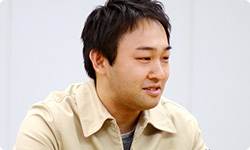
I’m Nagata from the Software Development Department. I was in charge of music.
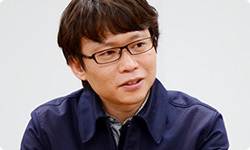
Thank you for coming today.
No problem.
Let’s start with you, Yabuki-san. Last time, everyone from Retro Studios1 said that when they first met the Nintendo staff, you gave a toast that made quite an impression. May I ask what you said? 1 Retro Studios, Inc.: A game development company in Austin, Texas. It was established in 1998 and has been involved in the development of games such as the Metroid Prime series and Donkey Kong Country Returns.
(tilting his head) To be honest, I don’t really remember. (laughs) I do remember saying something like, “Retro Studios and EAD will become one team.”
I guess that remark from you made an impression.
I’m not sure.
Maybe it was his haircut that made an impression. Just joking. (laughs) He made a presentation there about what kind of game Mario Kart 7 should aim to be. He placed special emphasis on how the Mario Kart series2 is for everyone to get excited playing together. That might sound like nothing special, but he gave a proper explanation laying out what the concept was. Perhaps that was what was so impressive. 2 Mario Kart series: A racing game set in the Super Mario world. The first game, Super Mario Kart, was released in August 1992 in Japan for the Super Nintendo Entertainment System. Mario Kart 7 is the seventh game in the series.
Ah, I see. Yabuki-san, how would you answer if asked, “What is Mario Kart?”
I would say it’s a kind of communication tool played together with everyone. It isn’t just game software. I want it to be a kind of daily communication.
That’s like what Konno-san said recently - in the Iwata Asks video on Nintendo Direct3 - about Mario Kart being a competitive communication tool. 3 Nintendo Direct: A new trial by Nintendo to deliver new information about Nintendo games directly to the people who visit the Nintendo website. It went live on October 21, 2011 in Japan.
Yes. It has to be a game in which everyone has a fun time racing and can win one time or three times or even take first place overall. I think that’s different from other games.
It is true that when skilled players and not-so-skilled players race each other in Mario Kart, the more skilled player doesn’t always win, so everyone who participates has to be able to enjoy it in accordance with their own skill levels. But the results of the race don’t just depend on the luck of how the items appear. The player also has to be able to think, “It’s a result of my driving.” That balance is unique in this game.
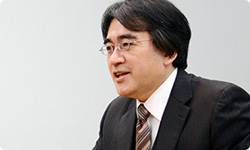
That’s right. We’ve tried to make it so that even if you lose, you get a certain something out of it to make you think, “That was fun!”
This time, you did about half of the design together with Retro Studios. Shiraiwa-san as program director and Nagata-san as the one in charge of music, what did you two think about that?
I was a little worried at first. During development, the programmers and designers sometimes have to change the data simultaneously. If that didn’t sync up, the work wouldn’t progress. When we thought, “We want you to change the data,” Retro Studios would be asleep, and when they had a question, we were asleep! (laughs) I wondered if we could make the game in the same period as previous games.
You were in different places, and it was your first time to work with them, which creates unease at first.
But their engineers lent solid support when it came to that. When the programming or data were off, they backed us up so work wouldn’t have to stop. We also talked with the Nintendo staff members who have been working a lot with Retro Studios about how to exchange data, and in the end we were able to proceed without any trouble.
Did you make any new and refreshing discoveries working with them?
There were discoveries, but a lot of the time I thought, “We’re the same!” They’re in America, a different country with a different culture, so I thought they would see things differently.
They’ve worked with the group led by (Kensuke) Tanabe-san4 for years, so a big factor is that they understand what Nintendo values. 4 Kensuke Tanabe: Software Planning & Development Department, Software Planning & Development Division, Nintendo. He has worked on the Metroid Prime series (Nintendo GameCube, Wii), Donkey Kong Country Returns (Wii), and other games. Previously appeared in Iwata Asks - Donkey Kong Country Returns.
That’s right. They know what’s fun about Mario Kart and what we want to leave in, so when they said, “This is what we want to do!” we thought, “Oh, okay!”
Nagata-san, how did it feel when the data came from overseas?
With regard to the courses they thought up, I would participate in periodic video conferences and gain a shared understanding of why they had made certain things. I think that was very helpful.
In the case of Mario Kart, the sound composer often discusses the overall image or atmosphere of the courses with the designers and planners while making the music. This time, we were working in cooperation with developers in America, so I think it was challenging for them.
They’re not in-house, so you can’t just pop over to their desk to ask questions.
There’s a group of select courses from past games called classic courses. As a player, I wanted to hear the old background music from those, so the first thing on my mind for the background music of the classic courses was recreating the original music As for the courses themselves, we paid attention to the old atmosphere while also making something new. I’m glad we resonated that way.
It seems that quite a lot was new and refreshing.
Yes, but like Shiraiwa-san said…
You were on the same wavelength more than you expected?
That’s right. When I played a new course, I would think about what kind of music to use and head off to a meeting, but usually they would say pretty much what I was thinking. Relieved, I would think, “Oh, they’re thinking the same thing!” (laughs)
Konno-san, when people play this game without any advance information, I imagine no one will notice that this game was a collaborative effort between American and Japanese developers.
I doubt they will. We worked hand-in-hand. Playing the courses that the other team had made provided good inspiration, so I think it was great.
